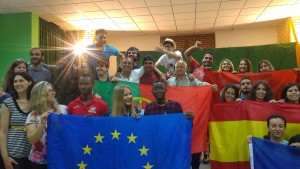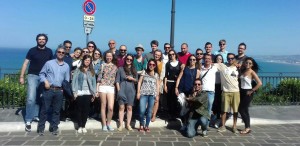{:it}
In Città un gruppo di 28 ragazzi da 7 Paesi dell’Unione Europea per un progetto sull’inclusione sociale tramite la musica, la fotografia ed il teatro.
Di seguito il link di un video-racconto.
[kad_youtube url=”https://www.youtube.com/watch?v=e9AvQqGNo_g” ]
Vogliamo condividere con la cittadinanza tutto l’entusiasmo dei 28 partecipanti al corso di formazione sull’uso delle arti performanti e dell’educazione non formale per l’inclusione sociale, svoltosi a Vasto dal 25 Maggio al 3 Giugno scorso nell’ambito del progetto “Inclusion” del programma europeo Ka1 Erasmus+.
Il corso era rivolto a docenti, animatori giovanili e volontari del settore Youth, sul tema dell’inclusione sociale e dell’integrazione interculturale; obiettivo del corso è stato il confronto con nuove prospettive di intervento resesi indispensabili dato il recente fenomeno migratorio e la situazione diffusa di disagio giovanile degli anni “post crisi”, fattori comuni a tutte le realtà europee che hanno innescato la necessità di società più attive ed inclusive.
Il progetto ha coinvolto sette diversi enti di 7 diversi Paesi Europei, chiamati a lavorare direttamente sulla formazione di animatori, educatori e volontari che nei centri giovanili, scuole, enti di formazione, centri di aggregazione, etc.., attraverso la formazione non formale ed informale, l’animazione socio-educativa, svolgono un ruolo di primaria importanza nell’arginare il fenomeno dell’emarginazione sociale.

Foto di gruppo con la bandiera dell’Unione Europea al termine dello spettacolo teatrale del 1° Giugno.
Dal 27 al 31 Maggio i partecipanti hanno lavorato in ben tre laboratori formativi su musica, fotografia e teatro sociale per acquisire nuove competenze educazionali, creative, relazionali e perfezionare le proprie conoscenze riguardo l’inclusione sociale grazie all’uso di strumenti utili e forme espressive elastiche per metterli nella condizione di poter replicare le iniziative nei vari contesti di riferimento, a contatto con giovani in condizioni di svantaggio, nonché in altri progetti.
Dopo questi cinque giorni di formazione hanno realizzato due diversi eventi pubblici nel quale hanno presentato i risultati del corso.
Il 1 Giugno hanno promosso, presso l’auditorium della Fondazione Padre Mileno, uno spettacolo teatrale con lo stesso titolo del progetto, “Inclusion”, nel quale con la tecnica del teatro-forum (detto anche teatro dell’oprimido) hanno raccontato scene di ordinaria esclusione sociale e, riarrangiando un finale alternativo con il coinvolgimento diretto del pubblico, “risolto” la situazione di disagio e dimostrato come sia possibile quotidianamente trasformarle in occasioni di inclusione sociale.
Mentre il giorno successivo, il 2 Giugno, si è svolto il secondo evento di promozione dei risultati concreti del progetto mediante l’apertura di una mostra fotografica con sottofondo musicale creato dagli stessi youth workers; la mostra dal titolo “Oltre i confini”, si è svolta presso il cortile del Palazzo D’Avalos, ed è stato un esempio di messa in pratica un’attività di educazione non formale sull’inclusione con le arti performanti e, allo stesso tempo, di sensibilizzazione sul tema dell’inclusione.
L’ultimo giorno ed avviare la buona prassi di “dissemination” del progetto, come previsto dal progetto.{:}{:en}A group of 28 participants from 7 European Union countries came to Vasto for a project on social inclusion through music, photography and theater.
Below there is the link to a video story.
[kad_youtube url=”https://www.youtube.com/watch?v=e9AvQqGNo_g” ]
We want to share with the citizenship all the enthusiasm of the 28 participants in the training course on the use of high performing arts and non formal education for social inclusion held in Vasto from 25th May to 3rd June in the framework of the project “Inclusion”of the European program KA1 Erasmus +.
The course was aimed at teachers, youth workers and volunteers from the youth sector, and it was focused on social inclusion and intercultural integration; the aim of the course was the comparison of new perspectives that were indispensable given the recent migration phenomenon and the widespread situation of youth discomfort of post-crisis years, factors common to all European realities that triggered the need for more active and inclusive societies.
The project involved seven 7 different organizations from 7 different European countries, called to work directly on the training of youth workers, educators and volunteers in youth centers, schools, training institutes, etc. through non-formal and informal training, socio-educational animation, as they play a primary role in derailing the phenomenon of social exclusion.
From May 27th to 31st, the participants worked in three training workshops on music, photography and social theater to acquire new educational, creative, relational skills and to improve their knowledge of social inclusion methodologies through the use of useful tools and expressive forms. These were made to put them in the condition of repeating initiatives in the various contexts and Countries of origin, with disadvantaged young people, as well as in other projects.
After these five days of training they made two different public events in which they presented the results of the courses.
On June 1st, at the auditorium of the Fondazione Padre Mileno, a theater show was presented with the same title as the Inclusion project, using the theater-forum technique (also known as the theatre of oppressed). Ordinary social exclusion scenarios were presented with alternative ends with the direct involvement of the public that “solved” the discomfort situation and demonstrated how it is possible to turn them daily on social inclusion occasions.
On the next day, June 2nd, the second event was created to promote the concrete results of the project by opening a photo exhibition with music background created by the same youth workers; The exhibition entitled “beyond borders”, was held at the courtyard of Palazzo D’Avalos, and was an example of putting into practice an informal education activity on inclusion with the performing arts and at the same time it could raise awareness about the topic of inclusion.
On the last day dissemination activities were set out during a joint session with all the participants.{:}
